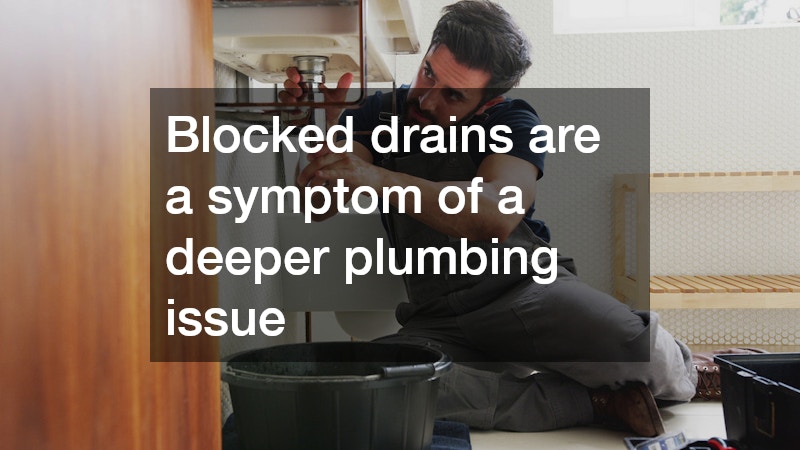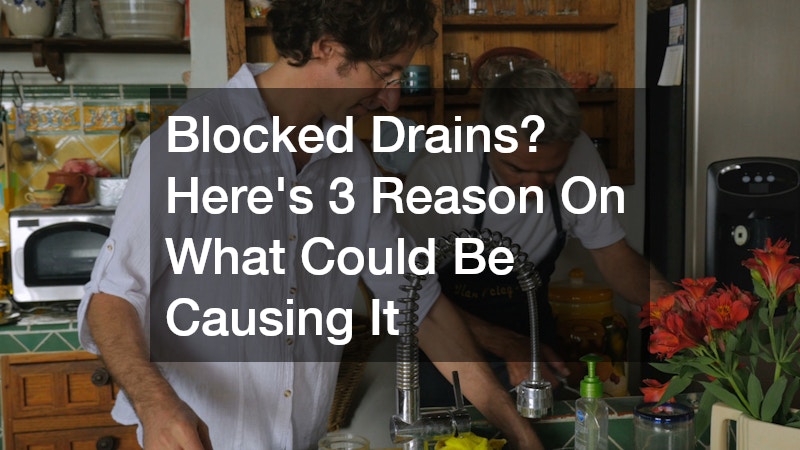Blocked drains are a common issue for homeowners and businesses alike and while they may start as a minor inconvenience, they can quickly escalate into a serious plumbing problem if left untreated. If you’ve noticed slow-draining water, unpleasant odours or gurgling sounds in your pipes, there’s a good chance that you’re dealing with a blockage. Understanding what causes blocked drains is essential to preventing them in the future and knowing when to call a professional. Below, we’ll explore three common reasons why your drains might be clogged and what you can do about it.
Hair Build-Up in Bathroom Drains
Hair is one of the most common culprits when it comes to blocked bathroom drains. Whether it’s from showering, shaving or washing your hair over the sink, loose strands can accumulate quickly in your drainage system.
When hair combines with soap residue and other debris, it forms a dense, sticky mass that clings to the inside of pipes. Over time, this build-up reduces water flow and eventually causes complete blockages.
What makes hair-related clogs particularly tricky is their location deep within the drainage system. While some homeowners attempt to remove hair using wire hooks or chemical solutions, these methods only offer short-term relief and can even damage your pipes if used incorrectly. If water continues to back up despite your efforts, it’s best to contact a qualified plumber who can professionally clear the obstruction and inspect your system for underlying issues.
Grease and Food Waste in Kitchen Sinks
Grease and food scraps are a major contributor to kitchen sink blockages. Many people assume that because cooking oils and fats are liquid when hot, it’s safe to pour them down the sink. However, as these substances cool, they solidify inside your pipes and trap other debris such as crumbs, coffee grounds and vegetable peelings. This mixture hardens into a sludge-like coating that narrows the pipe diameter and slows down drainage.
Even if you run hot water while pouring oil down the sink, it’s not enough to prevent solidification further down the system. Over time, the accumulated grease forms a thick layer that can completely block the pipe and require extensive cleaning. To prevent this, always dispose of oil and fat in a sealed container and avoid washing large food particles down the drain.
If your kitchen sink is draining slowly or producing a foul smell, it could be a sign of a grease build-up. A licensed plumber can safely remove the blockage using specialised tools such as drain snakes or hydro-jetting equipment, restoring your drainage system to full function without causing damage to your pipes.
Tree Root Intrusion in Underground Pipes
While it may sound surprising, tree roots are one of the most destructive causes of blocked drains, especially in older homes with clay or concrete pipes. Roots naturally seek out moisture and nutrients and your underground plumbing provides an ideal environment for growth. Even the smallest crack or joint in a pipe can attract root systems, which infiltrate the space and expand over time.
Once inside the pipe, tree roots can create a tangled mess that traps debris and completely obstructs water flow. The damage doesn’t stop there — as roots grow and thicken, they can crack or collapse the pipe entirely, leading to expensive repairs. If you’ve noticed recurring drain issues, particularly in outdoor or basement areas, root intrusion could be the cause.
Diagnosing this type of blockage requires a professional inspection with a CCTV drain camera, which allows your plumber to locate the exact site of the problem and assess the extent of the damage. Depending on the situation, they may recommend high-pressure water jetting to clear the roots or even replacing a section of pipe if the damage is severe.
When to Call a Professional
While some blocked drains can be resolved with DIY methods, ongoing or severe blockages should always be handled by a licensed professional. Attempting to clear drains with store-bought chemicals or makeshift tools can damage your plumbing and may only provide temporary relief. A certified plumber has the tools and expertise to properly diagnose the issue, clear the obstruction and prevent it from recurring.
In many cases, blocked drains are a symptom of a deeper plumbing issue, such as ageing pipes or poor drainage design. A professional can identify these underlying causes and provide long-term solutions that protect your property from future problems.
Preventative Measures for the Future
Prevention is always better than cure, especially when it comes to your home’s plumbing. Simple habits such as using drain guards in showers, disposing of grease in the bin and scheduling regular plumbing inspections can significantly reduce your risk of blocked drains. Additionally, planting trees and shrubs away from underground pipe systems can minimise the risk of root intrusion.
By staying vigilant and proactive, you can avoid the frustration and cost of recurring blockages. If you’re dealing with persistent drain issues or want to ensure your system is in good condition, don’t hesitate to contact a local professional. With expert advice and timely intervention, you can keep your drains flowing smoothly year-round.
.



